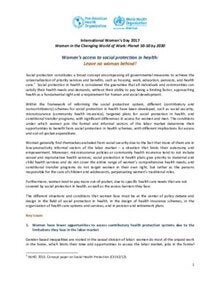Fact sheet - Women’s access to social protection in health: Leave no woman behind!

|
International Women’s Day 2017 - Women in the Changing World of Work: Planet 50-50 by 2030 Social protection constitutes a broad concept encompassing all governmental measures to achieve the universalization of priority services and benefits, such as housing, work, education, pensions, and health care. Social protection in health is considered the guarantee that all individuals and communities can satisfy their health needs and demands, without their ability to pay being a limiting factor, approaching health as a fundamental right and a requirement for human and social development. Within the framework of reforming the social protection system, different (contributory and noncontributory) schemes for social protection in health have been developed, such as social security, microinsurance (community health insurance), targeted plans for social protection in health, and conditional transfer programs, with significant differences in access for women and men. The conditions under which women join the formal and informal sectors of the labor market determine their opportunities to benefit from social protection in health schemes, with different implications for access and out-of-pocket expenditure. |
